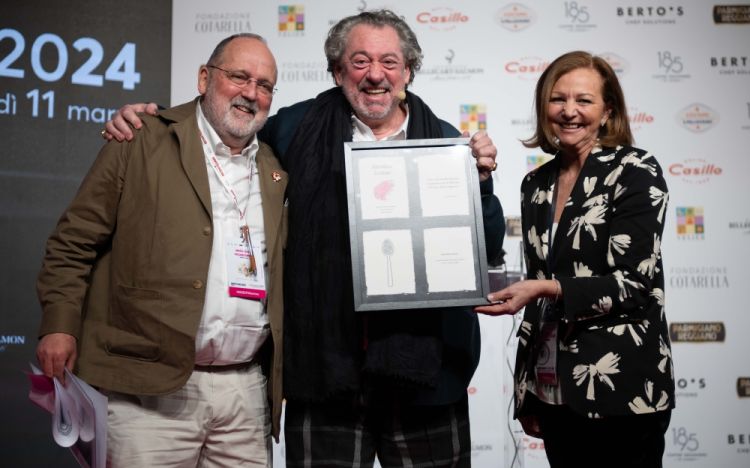Bruno Verjus disobedient? Without a doubt. Indeed, we could almost say that no one could embody, in this nineteenth edition, the concepts that inspired its leit motif like the Frenchman. A quote from philosopher Erich Fromm, 'The act of disobedience, as an act of freedom, is the beginning of reason', could almost be a caption to describe some of Verjus' choices, one in particular.
Introducing him on stage, Cinzia Benzi could only start from that crucial moment in the personal life of the French chef, who has only been a chef for a few years, so much so that he can be defined (and wants to define himself), 'the oldest of the young chefs'.

Verjus's talk was moderated by Cinzia Benzi
In fact, this cultured and energetic gentleman, born in Roanne in 1959, has dedicated many years of his life to the profession of food critic, working for various French publications and for the prestigious Parisian festival
Omnivore, as well as for his beautiful blog
Food Intelligence (which stopped in 2017 but is still very entertaining to browse through). He was also an assiduous contributor to the
Identità Golose Guide for five years, giving us valuable analyses and incisive accounts of his country's culinary trends.
In 2013, at 54, he announced the completely surprising choice of leaving journalism to open his restaurant Table in Paris, on Rue de Prague, near the Gare de Lyon. He earned his first Michelin star in February 2018 and his second four years later.
Even the choice of location, for a restaurant with certain ambitions, was disobedient: 'The 12th arrondissement is a very working-class neighbourhood and local restaurants don’t have starred ambitions. In fact, I am proud of my choice against the tide, of the visibility I have brought to that corner of Paris and of the fact that Table is the first restaurant in our neighbourhood to win two Michelin stars.’
The most crucial disobedience in the life of Bruno Verjus was not against someone or something but 'against myself. It is with oneself that the most radical revolutions must be carried out; if I had not done so from a young age, I would probably be an old medical professor today, because I would have followed the path already started by my parents. Instead, I disobeyed several times: the first time you are very afraid, then it becomes easier.’
Although the choice to become a chef, after years as a food critic, and to do so as a self-taught chef, was a very bold transgression: 'A self-taught chef in France? I can't think of a more outrageous disobedience! There’s a strong feeling of belonging to the profession in my country: for me, the fact that I felt somewhat isolated allowed me to express myself freely. To cook the way I want to do, to cook what I want to eat, without caring about awards and accolades. What really interests me, instead, is the dialogue with my colleagues'.
Awards, however, and one in particular, changed
Table's story. When the
World's 50Best moved his restaurant up to tenth place, Bruno Verjus saw his audience change: 'The impact of the 50Best is remarkable, especially in terms of how many foreign customers it directs to your restaurant. Today, about 70% of our visitors are not French, especially not Parisians, which might not be a bad thing given that all the inhabitants of Paris are harsh gastronomic critics!.’
Chatting with our Cinzia Benzi on the stage of Identità Milano 2024, Bruno Verjus then recalled two chefs that he considers points of reference, masters, such as Alain Passard ('The extraordinary work he did on the use of vegetables in the kitchen is a great innovative disobedience') and Bernard Pacaud ('His transgression was instead to remain tied to classicism without fear of appearing passé, working on an immediate cuisine'). And he drew a fascinating analogy between his previous and his current profession: 'I used to tell stories with my pen, today I tell stories with my food, it's just a different form of writing.’
His voice, always tinged with irony, showed instead some emotional inflection when he spoke of the team spirit that one breathes at Table: 'Our menu is born from teamwork, from a continuous shared discussion on the products that arrive daily in the kitchen. This is how the ideas for the dishes we propose are born. Team spirit is built through daily work, rest too: this is why the restaurant is only open four days a week, with the weekend completely free, to protect the right of those who work with me to have a peaceful life. The time has really come to leave behind all the nonsense of the past: the rigour, if not violence, of discipline in the kitchen, the bullying and sexism. Enough of all that.’

Bruno Verjus with Paolo Marchi and Cinzia Benzi
In a few days, the ceremony unveiling the new Michelin stars in France will take place. ‘Are you hoping for a third star?’ asked Paolo Marchi. Verjus smiled, assuring that there will be no third star this year. And he concluded: 'I don't cook for Michelin, I don't cook for stars. If I did, I could not produce anything sensible, I would remain anchored in a past that does not interest me. Cooking, on the other hand, must be a way of giving people happiness. Do you know why? Because there is no greater disobedience than happiness.’
Applause for Bruno Verjus.
Translated into English by Slawka G. Scarso